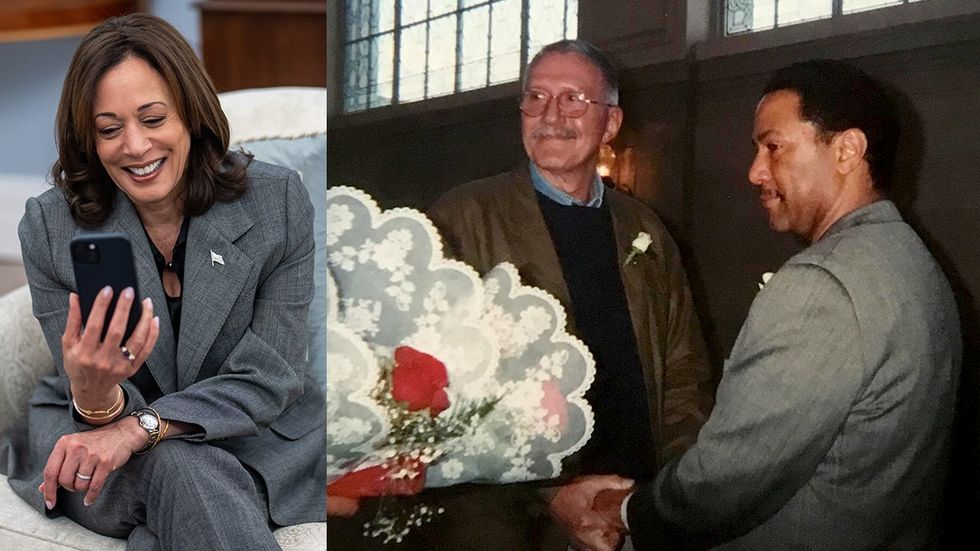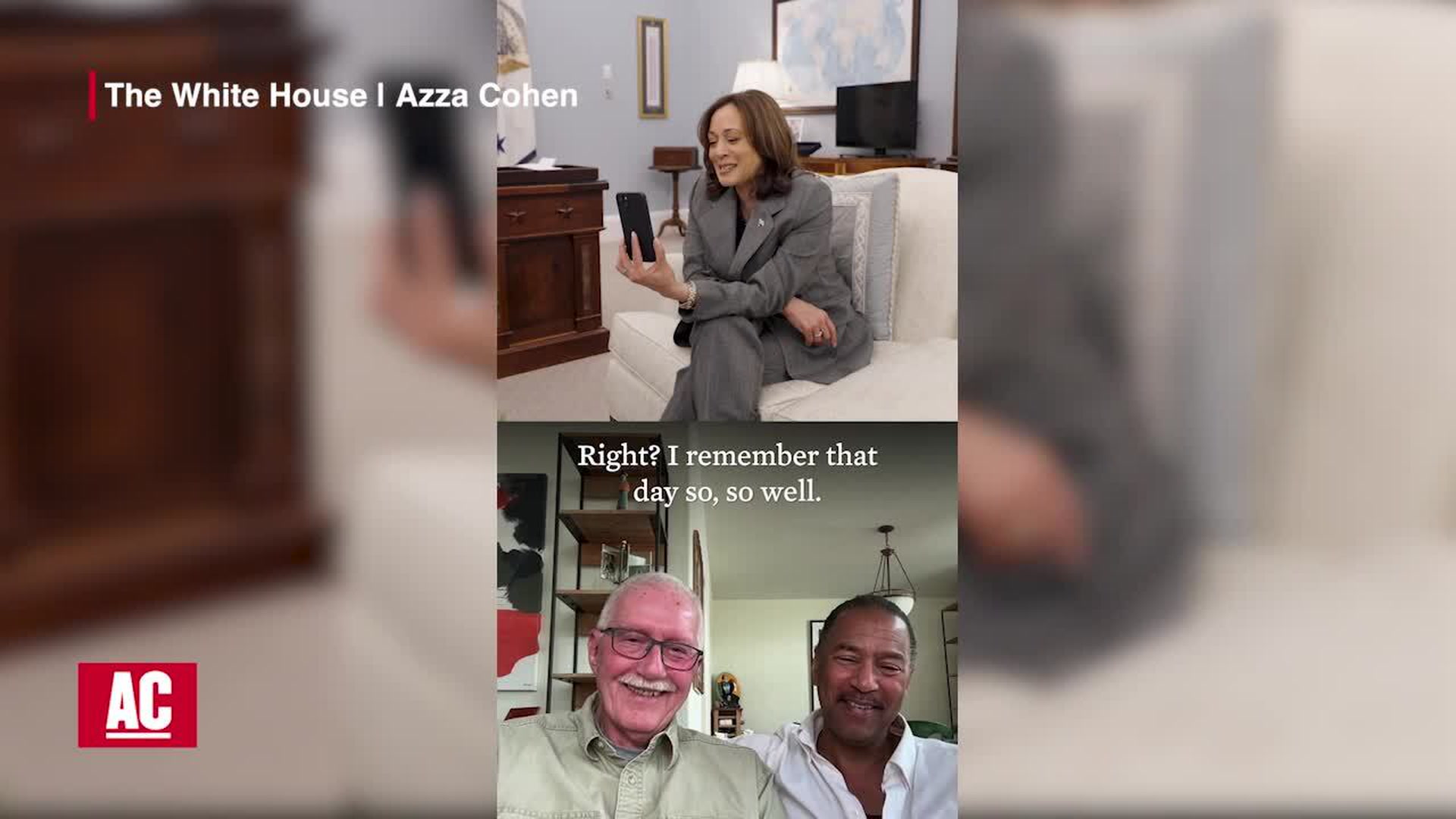Twenty years have passed since Vice President Kamala Harris, then serving as the district attorney of San Francisco, took a bold step in officiating some of the nation’s first same-sex marriages. That historic act defied legal restrictions and marked a pivotal moment in the struggle for LGBTQ+ rights.
Watch Vice President Harris and the couple she married 20 years ago reunite.
Related: 89 Images of Vice President Kamala Harris Behind the Scenes from The Advocate’s Exclusive
In a heartwarming video call earlier this week, to which The Advocate was granted access, Harris reconnected with Bradley Witherspoon and Raymond Cobane to commemorate the 20th anniversary of their marriage—a union she officiated, after Gavin Newsom, then San Francisco’s mayor, declared marriage equality in the city. Although the marriages were later nullified by court action, the march toward equal rights wasn’t over.
 Courtesy Bradley Witherspoon & Raymond Cobane
Courtesy Bradley Witherspoon & Raymond Cobane
The interracial gay couple expressed their astonishment at how quickly two decades had passed, a sentiment echoed by Harris, who reflected on the profound impact of that historic day in 2004. They reminisced about the couple’s unexpected decision to marry after 18 years together, spurred by the realization of the importance of legally recognizing their love and honoring the efforts of those who made it possible. The conversation also touched on the joy and unity witnessed at San Francisco City Hall, contrasting sharply with current challenges facing LGBTQ+ rights, including the recent rollback of freedoms and the ongoing battle for equality.
Harris emphasized the significance of continuing to fight for freedom and equality for all, including the LGBTQ+ community, underscoring the importance of voting and active participation in democracy to protect these hard-won rights. The call was not just a celebration of Witherspoon and Cobane’s love story but also a reminder of the broader implications of their union in the context of civil rights and the ongoing struggle for justice and equality.
Related: Kamala Harris: Our One-on-One With the Vice President
Cobane and Witherspoon reflected on the monumental day in an interview with The Advocate.
“It was just a wonderful, joyous occasion to see so many happy people there,” Witherspoon said. “The tears of joy from everyone. It was quite a surprise for us that this thing was happening.” Initially envisioned as a low-key event, their wedding blossomed into a vibrant celebration of love, unity, and community support.
 Courtesy Bradley Witherspoon & Raymond Cobane; Lawrence Jackson/The White House
Courtesy Bradley Witherspoon & Raymond Cobane; Lawrence Jackson/The White House
In an interview with The Advocate in May, Harris delved into her long-standing support for the LGBTQ+ community, recounting her emotional journey and the significance of those early marriages. “One of the most joyful [moments of my career] was performing the marriages in 2004. Truly joyful,” Harris said, reminiscing about the electric atmosphere of love and unity that enveloped San Francisco City Hall on that Valentine’s weekend. She described the scene as one filled with “people of every race, every color, every size, every configuration…wrapped around a whole city block and beyond,” emphasizing the deep impact of witnessing such pure joy and the collective realization of a long-fought battle for recognition and equality.
Throughout her career, Harris has been an unwavering ally of the LGBTQ+ community, from creating one of the nation’s first LGBTQ+ hate crimes units as district attorney in San Francisco to refusing to defend Proposition 8 as California’s attorney general. Her efforts have contributed significantly to the advancement of LGBTQ+ rights, highlighted by her crucial role in reestablishing marriage equality in California.
However, the journey is far from over, the couple noted. While celebrating their love and the progress achieved, Witherspoon and Cobane also voiced concerns over the resurgence of efforts to undermine LGBTQ+ rights. Cobane lamented the politicization of transgender people’s identities.
“It bothers me because they take a group of people, and what they do is try to divide other people by using this group,” he said.
 Lawrence Jackson/The White House
Lawrence Jackson/The White House
In her conversation with The Advocate, Harris highlighted the interconnected struggles of various communities, emphasizing the importance of coalition building and collective action in the face of ongoing attacks on LGBTQ+ rights, transgender people’s access to gender-affirming care, reproductive rights, and voting rights. She passionately argued against the demonization of empathy and the strength of supporting marginalized voices, stressing, “The true measure of strength is not based on who you knock down. It’s based on who you lift up.”
As the nation reflects on two decades since those first marriages, the story of Harris, Witherspoon, and Cobane serves as a powerful reminder of the ongoing fight for equality, the importance of legal recognition of same-sex marriages, and the need for continued advocacy and vigilance in protecting LGBTQ+ rights for future generations.
More than 71 percent of Americans now support the right of same-sex couples to get married, according to a 2023 Gallup poll.
During her interview with The Advocate, Harris also spoke candidly about the significance of the Respect for Marriage Act signing ceremony at the White House in 2022, where President Joe Biden handed her the pen he used to sign the bill. The gesture, rich in symbolism, was an acknowledgment of Harris’s long-standing commitment to LGBTQ+ rights and a poignant reminder of the journey from those early days of advocacy to the present. “I was so deeply touched for so many reasons,” Harris shared, reflecting on the evolution of the movement and the importance of continuing to build upon the progress made.
She said that she hoped that the move would spur Americans’ curiosity.
“It could evoke a conversation that reminds us of just the last 20 years in this movement and the importance of allyship, the importance of understanding that this is about all of us,” Harris said. “Nobody should be made to fight alone. And our president has been in front of this issue for so long also, so to be with him on the stage where there’s a mutual recognition of what this means in terms of our mutual commitment to this issue—that also meant a lot.”
Harris reminisced about the early days of her involvement in the LGBTQ+ rights movement, recalling the joy and hope of those San Francisco City Hall marriages. She connected these memories to her broader vision of justice and equality.
Cobane’s and Witherspoon’s reflections on the current political climate regarding transgender rights and the broader LGBTQ+ community offer a poignant insight into the ongoing struggles for equality and acceptance.
“Being the political person I am, it bothers me because this happens so often that you take a group of people, and what you do is you try to divide other people by using this group,” Cobane said. “And it’s happening primarily now, I think, with transgender people, that they’re being turned into political footballs just for a political party’s profit, and [Republicans] hope to gain votes on the backs of transgender people.”
Witherspoon echoed this sentiment, lamenting the contrast between the unity experienced on their wedding day and the divisive tactics now observed in political discourse.
“What’s going on in the world today makes me realize that you cannot take what we have for granted. Yes, we have the right to marry today, but one of our Supreme Court justices has already said that if he had his way, he would overturn that decision and take that right to marry away. And now we have not only a Congress but a judicial branch of government that thinks it’s okay to strip away rights that we’ve had for many years,” he said.
“And that should let people know that you can never sit back and get too comfortable, especially when dealing with issues that involve people who might not be considered the norm or a mainstream part of society, he continued. “So we have to realize that it’s a fight that we have to continue to do, and if we don’t, we will end up losing those rights, and that’s sad, and that’s frightening, and it just makes me angry that we have to do this. We just want to be left alone to live our lives and not live in fear.”




 Courtesy Bradley Witherspoon & Raymond Cobane
Courtesy Bradley Witherspoon & Raymond Cobane





























 Courtesy Bradley Witherspoon & Raymond Cobane; Lawrence Jackson/The White House
Courtesy Bradley Witherspoon & Raymond Cobane; Lawrence Jackson/The White House Lawrence Jackson/The White House
Lawrence Jackson/The White House

















































Fans thirsting over Chris Colfer's sexy new muscles for Coachella